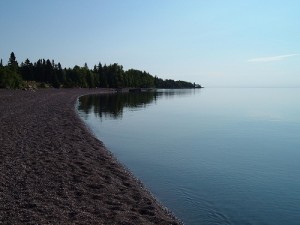Great Lakes beaches will have more strict, comprehensive monitoring and faster public warnings of contamination if two U.S. Senators have their way.
Sen. Frank Lautenberg, D-N.J., and Sen. Mark Kirk, R-Ill., introduced legislation last month that would reauthorize and amend the Beaches Environmental Assessment and Coastal Health (BEACH) Act by requiring advanced monitoring and faster public notification at coastal and Great Lakes’ beaches.

A bipartisan sponsored bill would expand beach monitoring and public outreach efforts. Photo: John Lillis (Flickr)
“Our nation’s beaches are a treasure and we need to do all we can to help them remain clean and safe,” Sen. Lautenberg said in a prepared statement. “A day at the beach shouldn’t turn into a day at the doctor’s office.”
The bill would require sanitary surveys and identification of contamination sources near beaches. The BEACH Act currently only requires and funds testing at the actual beach.
“This will allow beach managers to come off the beach a little bit and find out if a nearby source is contributing to the beach closure,” said Shannon Briggs, a toxicologist for the Michigan Department of Environmental Quality.
Sanitary surveying is collecting information on what else is going on at the beach when water samples are taken.
“Are there high waves, is it raining, is it hot, are there birds present … this information lets you know what else is going on when you take a sample and you can start to see trends,” Briggs said.
Additionally, the act calls on the EPA to determine and then require a beach testing method that provides results less than four hours after laboratories receive the samples.
Health authorities would be required to tell the public within two hours when samples are contaminated.
The bill’s language is restrictive when it comes to faster testing methods, said Julie Kinzelman, lab director for the City of Racine (Wisc.) Health Department.
“It (the bill) gives the connotation that the method will be laboratory testing,” Kinzelman said. “But there are other things that test rapidly, like a forecast model.”
Such models predict beach and water quality based on data from sanitary surveys.
“The language as it stands is not inclusive of that option (forecast models), so we don’t know what criteria the EPA will come out with,” Kinzelman said.
Kinzelman also fears that some communities wouldn’t have the resources to comply with the legislation, which has a one-year implementation period for rapid testing at beaches.
But thanks to the Great Lakes Restoration Initiative, sanitary surveys, identifying contamination sources, rapid testing and real-time public notification are already common practices in Michigan and most Great Lakes states, Briggs said.
The federal initiative is intended to protect and clean up Great Lakes environments.
“The Great Lakes Restoration Initiative allowed us to do a lot of what this bill is requesting,” Briggs said. “And it’s made a huge impact.”
The original BEACH Act required all coastal states to adopt water quality standards and establish monitoring and notification programs for beachgoers. Coastal and Great Lakes states apply for funding to monitor recreational water under the act.
There were approximately 1,000 beaches monitored nationwide in 1997 and 3,800 in 2009, according to the EPA.
And even though many Great Lakes states have taken steps to improve beach monitoring without these regulations, the “Great Lakes Restoration Initiative will not go on in perpetuity,” Kenzelman said.
It is currently scheduled to run through 2014.
This strengthening of the BEACH Act would be a great thing for the Great Lakes, Briggs said.
“We would like to see the BEACH Act catch up to where we are,” Briggs said. “And we’d like to see the funding catch up to where it’s needed to keep beaches clean and the public informed.”
The “Clean Coastal Environment and Public Health Act of 2011” has been referred to the Committee on Environment and Public Works.
Sens. Lautenberg and Kirk did not return phone calls for comment.
For more info:
International Joint Commission’s 2011 Beach Report and,
A Great Lakes Echo summary of the report
